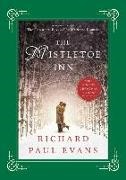Read more
Zusatztext “What better than a holiday themed book for Christmas? The Mistletoe Inn: A Novel is a must-read for any hopeless romantic! especially during the holidays!” Informationen zum Autor Richard Paul Evans is the #1 New York Times and USA TODAY bestselling author of more than forty novels. There are currently more than thirty-five million copies of his books in print worldwide, translated into more than twenty-four languages. Richard is the recipient of numerous awards, including two first place Storytelling World Awards, the Romantic Times Best Women’s Novel of the Year Award, and five Religion Communicators Council’s Wilbur Awards. Seven of Richard’s books have been produced as television movies. His first feature film, The Noel Diary , starring Justin Hartley ( This Is Us ) and acclaimed film director, Charles Shyer ( Private Benjamin , Father of the Bride ), premiered in 2022. In 2011 Richard began writing Michael Vey, a #1 New York Times bestselling young adult series which has won more than a dozen awards. Richard is the founder of The Christmas Box International, an organization devoted to maintaining emergency children’s shelters and providing services and resources for abused, neglected, or homeless children and young adults. To date, more than 125,000 youths have been helped by the charity. For his humanitarian work, Richard has received the Washington Times Humanitarian of the Century Award and the Volunteers of America National Empathy Award. Richard lives in Salt Lake City, Utah, with his wife, Keri, and their five children and two grandchildren. You can learn more about Richard on his website RichardPaulEvans.com. Klappentext "The New York Times bestselling "King of Christmas Fiction" presents a romantic new holiday story about two romance writers who are searching for the kind of love that, so far, they have only written about"-- Leseprobe The Mistletoe Inn My mother attempted suicide four times before she finally succeeded. At least those are the attempts that I know about; there could have been more, as my father often ran interference, hiding things that he thought would hurt me. My mother suffered from major depression. She also had migraines. By most accounts they were unusually severe. She almost always had visual effects, seeing strange lines and flashes of light and sometimes hearing voices. When the migraines came she never left her room. Doctors tried to help, though it seemed to me like they were bailing out a sinking boat with a paper cup. Most just medicated her with the latest trending mind drug: Valium, Xanax, Prozac, etc. A few told her to “buck up,” which was like telling a stage-four cancer patient to just get over it. Then there were the insufferable people who said stupid things like, “I was depressed once. I went for a walk,” or, “You have so much to be thankful for, how can you be depressed?” then smugly walked off as if they’d just performed a service to society. With my mother almost always ill, my father did his best to pick up the slack. It was not unusual for him to come home from a long day of work, make dinner, clean the kitchen (with my help), then put in the laundry. I could never figure out why my father stayed with her. The Christmas afternoon my mother died was the first time I ever saw my father cry. He also cried at her funeral, which for me was the most upsetting part of the day. I know that sounds weird, but in my young mind, my mother had died long before we buried her. After the funeral, my aunt took me for a couple of days, until my father came and got me and we went on with our lives. Just like that. Just like nothing had happened. My father, Robert Dante Rossi, didn’t have a degree, but he was smart. He had ...

